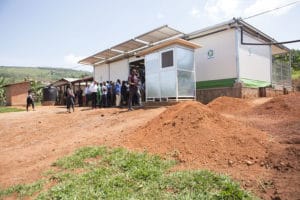A new African Centre of Excellence for Sustainable Cooling and Cold-chain (ACES) based in Rwanda will help get food to markets quickly and efficiently. It will help farmers and fisheries in Africa reduce the estimated 30% of food produced for human consumption which is lost due to poor post-harvest practices and handling – tackling hunger, under-nutrition, and environmental impacts, while boosting profits and creating jobs.
 ACES is a collaboration of the Governments of Rwanda and the United Kingdom, UNEP’s United for Efficiency (U4E) initiative, University of Birmingham and the Centre for Sustainable Cooling, and academics in both countries. It is being pursued through the Rwanda Cooling Initiative (R-COOL), a joint U4E and Rwanda Environment Management Authority (REMA) programme to advance the country’s sustainable development priorities and ambitions for enhanced collaboration on sustainable cooling throughout the continent.
ACES is a collaboration of the Governments of Rwanda and the United Kingdom, UNEP’s United for Efficiency (U4E) initiative, University of Birmingham and the Centre for Sustainable Cooling, and academics in both countries. It is being pursued through the Rwanda Cooling Initiative (R-COOL), a joint U4E and Rwanda Environment Management Authority (REMA) programme to advance the country’s sustainable development priorities and ambitions for enhanced collaboration on sustainable cooling throughout the continent.
The new Centre will be located in Kigali and will address the challenges of how to create local and global “field to fork” connectivity from hundreds of thousands of small-scale farmers, whose livelihoods and well-being are dependent on only 1-2 hectares, while leapfrogging to sustainable solutions which drastically reduce dependency on fossil fuels and refrigerants with a high climate impact. To achieve this, the Centre will link farmers, logistics providers and agri-food businesses with a range of experts and investors from across the continent.
Associated “Living Labs” in strategic locations will conduct state-of-the-art research and offer technical assistance, demonstrations and knowledge transfer. The first Living Lab is anticipated in rural Rwanda, with others to follow in additional countries.
The success of the Centre will be measured in terms of:
- Increased value from production and “waste”
- Reduced post-harvest losses
- Increased throughput to new markets and food exports
- Increased rural jobs
- Improvement in diets
- Minimisation of new CO2 impact
A further benefit of the Centre is the link to the broader cooling needs for medical and health cold-chains that are critical for pandemics, epidemics and natural disasters. Alongside the task to develop, test and manufacture vaccines, distribution for mass, rapid treatment is needed – likely in a cold-chain to protect the potency.
More information on the Centre can be found in the ACES flyer on the U4E website.


Leave a Reply